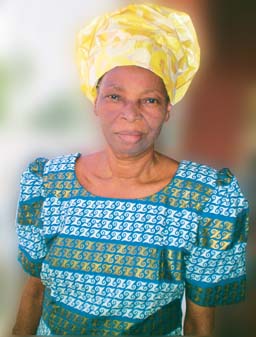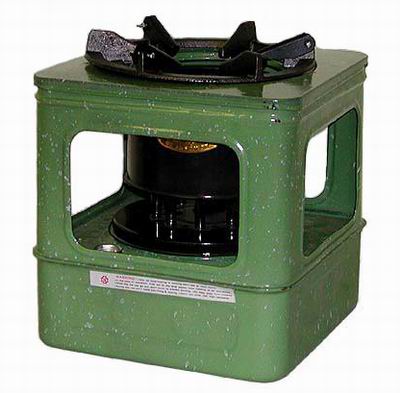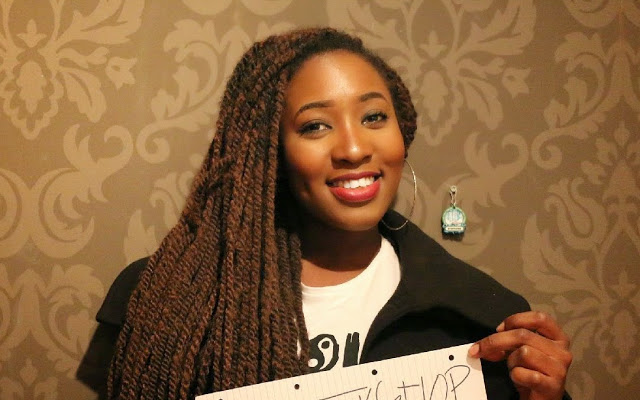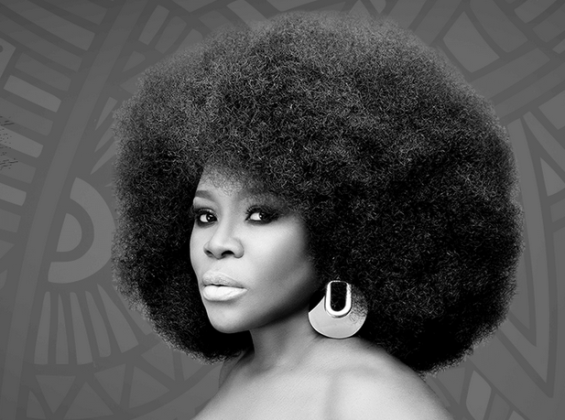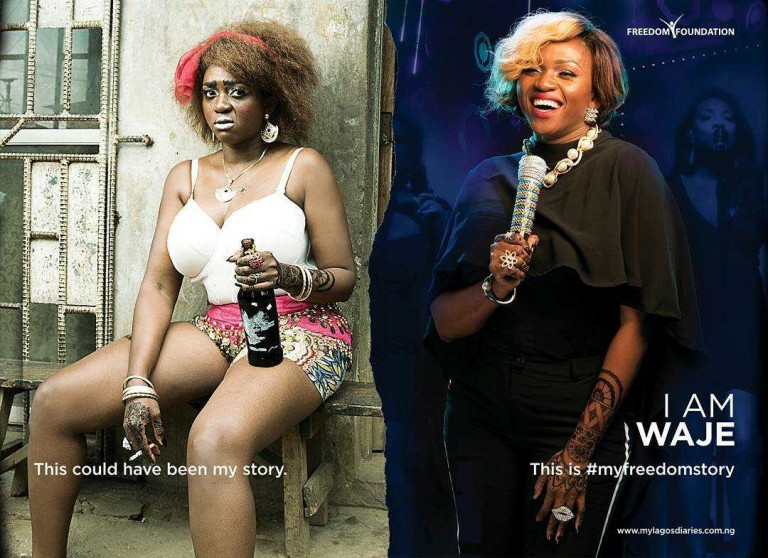Mrs. Deborah Adebola Fasoyin is the leader of the renowned Good Women Choir which has been in existence for over 40 years and noted for sonorous hits such as Halleluyah and Odun Nlo Sopin. In this interview, the septuagenarian speaks about the music group, family and other things.
Background
I am a native of Oyo town and the youngest child and only girl of six children so I have five brothers. For my elementary education, I attended Saint Andrews Demonstration School, Oyo, although I didn’t finish from there because my father; being an illiterate felt there was no need to educate the girl-child since she will end up in the kitchen. My brothers therefore took me to Jos so that I could continue my education. I spent one year there, another in Ogbomosho and Lagos. They were just passing me on so that I would not stay in Oyo and my parents would not spoil me. I ended up finishing my primary school in Lalupon, near Ibadan. I went to primary school in five different towns. I thereafter went to Anglican Girls’ Modern School, Oritamefa, Ibadan and after my first year there, nobody could send me to school again so I had to go and teach for a year in a village in Oyo Town before I came to Lagos and joined Kingsway Stores where I spent 29 years as a sales clerk before I retired. However, when I got married, I had to go and meet my husband in Ibadan, so you can say that fate brought me back to the town. Luckily too, I had all my children before Good Women Choir started.
Establishment of Good Women Choir
Let me start by saying it is Christ that leads the choir, not me. It is just a privilege that I am the leader. Good Women Choir started way back with the Christ Apostolic Church, Ibadan and prior to 1975, they were known as the Good Women Association which was a gathering of women in the church. If your spouse is a member of CAC, automatically, you are a member of the association as a woman. Every year, we hold conventions in Lagos, Kano, Kaduna and other places. I was an Anglican before I married my husband who is a member of the CAC. The problem we had then was that when we arrived in any town, it was always difficult to get a choir to sing and make us feel relaxed. Consequently, in 1975, when we came back from Kano, the Good Women Association decided that we should have our own choir. An announcement was made in all branches of the church that every branch should send two educated members who are interested in music to make up the Central choir. We gathered and we were about 100 plus at the time and started practising. I was already a member of the choir in the Anglican Church before I joined the CAC Eleta where I continued. I was one of the people sent to the Central Choir. Before each convention, we tell our members to read the Bible, pray and bring songs. We’ll look through and as led by the spirit, choose from the compositions. At a stage, we were told that we could wax a record.
Leading the group
It was divine intervention because up till date, it frightens me. When we had the first anniversary of the Good Women Choir, I arrived at the church, saw the pamphlet which read, “Leader-D.A. Fasoyin.’’ I nearly fainted because no one called to tell me that I would be the leader. I felt that every member of the group at the time was qualified and could lead. I was singing soprano and we had alto and tenor singers as well. I was really surprised, so it was really God’s intervention.
Interest in Music
That’s the miracle because my parents were illiterates. One day, in church, we wanted to have our harvest and the choir was to sing. I was only 10 years old and I had been exposed to music. Someone was asked to dance in a particular way. I think it was called Rhumba dance and this girl simply refused to learn. As an onlooker, I told them that, ‘‘Look, I can do this.’’ I did it so well and became a member of the choir at age 10. This was fuelled by the fact that I had personal interest in singing and the interesting thing is that all my brothers (I’m the youngest of six children and only girl) were organists and singers and they encouraged me to explore my musical side.
Challenges
The only challenge that I can remember vividly was after recording our third release; Mon Woju Re Olorun Mi, one of us; a tenor singer was asked to come out of the group to lead.
New faction
We went to God in prayer on the mountain and told Him that if what happened was His will, He should help them to continue because the ultimate is to change lives but if their mission is to bring us down, He should intervene. Of course, people were deceived. Many bought the factional albums because they thought that it was released by us so there was some kind of confusion but later, after the third album, they knew the difference and stopped buying their albums. Some of your classical hits in the group include Halleluyah, Odun Nlo Sopin among others. Did you commission songwriters to write the lyrics perhaps?
Our system of composition is different from others because it is a group. Whenever we want to go into the studio, we assemble and tell our members that we want to go for another release and everybody should bring what they have composed. We will bring them together and by the spirit of God, we would look at which ones can make the next release. After doing that, we keep other compositions for the next album.
Fullfillment
I am just 77 years old and I am so glad that after all these years, we are still relevant as a group because you can imagine a group that took a break for 10 years, came back and people still accepted them; it’s amazing and it’s a miracle. I am so happy within me that I am still useful for God because I am now a member of Daystar Christian Centre where I am the President of the Golden Mothers, which is for those who are 50 years and above.
Receiving Royalties
Yes we do and we share it even among deceased members’ families because they worked for it. We were scared of collecting it initially because of what God had told us and said we didn’t want to collect still. We told our manager to help us buy instruments so that anywhere we go, we won’t have to borrow. When Odun Nlo Sopin started bringing in money, we told him that we needed a bus. These days, those who go into gospel music expect quick money. I often tell people who come to me for advice that, ‘If you know that you want to propagate the gospel, don’t think about money.’’ Seek the anointing first, then money will follow. If you think about the money first, your album may do well in the market but it won’t last and that’s the truth but if you have the mind-set of spreading the gospel in your heart, things will work. Youths of today want quick money and rush to the studio to record an album. When it comes out, it doesn’t even have substance. You cannot blame most of them, there are no jobs after they leave school.
Originator of Odun Nlo Sopin?
Thank you for that question, it is actually a CAC composition which dates back to the early 1940s. It was a hymn that was sung at the end of each year by all CAC churches but we added only two verses to the original composition so one can’t really say who wrote it but many have said that we made it famous and we thank God for that. We also recorded the song, Gbakoso(Take Charge) during the regime of General Ibrahim Babangida which reflected what was going on in the country at that time.
Family Support
My second son is our manager now and my two daughters have also joined the choir.
Me Time
I read the Bible and pray.
What I want to be remembered for
I want to be remembered as one who touched lives. I feel fulfilled when I hear people listening to Odun Nlo Sopin over the years. I also want to finish strong and empty before I go and meet my creator.
Source: PUNCH
Photography in Nigeria is one of the fastest growing professions today. Nigerians have come to realize the essence of photography and how it affects our everyday lives. Unlike before, photography is now seen as a proper profession.
Most photographers earn as much as six figures per job and get up to three jobs in one day. Photography also used to be known as a male dominated job, but recently, females have proved the saying, ‘What a man can do, a woman can do better right, as they have embraced photography and are doing great at it.
Here are 10 Nigerian female photographers excelling at their jobs:
1. TY Bello
 Toyin Sokefun-Bello, better known as TY Bello, is a Nigerian singer, songwriter, photographer and philanthropist. She is popularly known for both her photography skills and singing skills and she has created a successful career for herself in both industries. She was trained by renowned photographer Don Barber, with whom she went to train after spending the first four months of her NYSC at Fototech.
Toyin Sokefun-Bello, better known as TY Bello, is a Nigerian singer, songwriter, photographer and philanthropist. She is popularly known for both her photography skills and singing skills and she has created a successful career for herself in both industries. She was trained by renowned photographer Don Barber, with whom she went to train after spending the first four months of her NYSC at Fototech.
2. Aisha Augie-Kuta
 Aisha is a photographer and film maker. She creates documentary, fashion and aerial photography. She explores a lot of ideologies in her works, such as portraying two sides to a story , gender and identity. Aisha’s photography creates visual art forms that speak through her lens.
Aisha is a photographer and film maker. She creates documentary, fashion and aerial photography. She explores a lot of ideologies in her works, such as portraying two sides to a story , gender and identity. Aisha’s photography creates visual art forms that speak through her lens.
3. Yetunde Ayeni-Babaeko
 Yetunde Ayeni-Babaeko is the CEO of CAMARA studios, an established photography studio based in Ikeja, Lagos. The Enugu born, Germany raised photographer has been taking the photography industry by storm since 2004 and is still conquering much territory. For Babaeko, women are the custodians of tradition, so she uses black and white photography to capture the timelessness of her goddesses. She also uses her photography to document and educate women on breast cancer.
Yetunde Ayeni-Babaeko is the CEO of CAMARA studios, an established photography studio based in Ikeja, Lagos. The Enugu born, Germany raised photographer has been taking the photography industry by storm since 2004 and is still conquering much territory. For Babaeko, women are the custodians of tradition, so she uses black and white photography to capture the timelessness of her goddesses. She also uses her photography to document and educate women on breast cancer.
4. Tosin Pedro Gbamis
 Tosin is a wedding and portrait photographer who travels all around Nigeria to capture and document rare moments in peoples lives. She tells the stories of love and life through her images.
Tosin is a wedding and portrait photographer who travels all around Nigeria to capture and document rare moments in peoples lives. She tells the stories of love and life through her images.
5. Bisola Ijalana

Bisola Ijalana is the Creative Director of M12BabyStudio. She enjoys creating arts of newborn, baby and Maternity Photography, capturing the essence and Purity of Life. Her Photography is for anyone who treasures the joy of a new life!
6. Yagazie Madu
 Yagazie Madu, a doctor of Optometry and the Head Visual Artist at Gazmadu Photography. She specializes in Portraits, Wedding and Lifestyle Photography. She also loves to capture and document moments, people, beautiful place, real life situations and a huge sucker for love stories.
Yagazie Madu, a doctor of Optometry and the Head Visual Artist at Gazmadu Photography. She specializes in Portraits, Wedding and Lifestyle Photography. She also loves to capture and document moments, people, beautiful place, real life situations and a huge sucker for love stories.
7. Adeola Olagunju
 Adeola Olagunju is quite unique with her works which is usually conceptual and deep. She is a critical, creative, meditative, and passionate artist. Her images speak volumes as they stage the photographer’s attempt to break free from the norm of photography
Adeola Olagunju is quite unique with her works which is usually conceptual and deep. She is a critical, creative, meditative, and passionate artist. Her images speak volumes as they stage the photographer’s attempt to break free from the norm of photography
8. Yemi Disu
 Yemi Disu is the CEO of Four23 Photography. She is into Maternity, wedding , kid and fashion photography. She started out with photography as a hobby and has now evolved in her profession.
Yemi Disu is the CEO of Four23 Photography. She is into Maternity, wedding , kid and fashion photography. She started out with photography as a hobby and has now evolved in her profession.
9. Iyaomolere Morayo
 Iyaomolere Morayo is the CEO of The Voice Photography. She prides herself ans her photofeaphy brand in Telling fantastic stories of love and family one frame at a time.
Iyaomolere Morayo is the CEO of The Voice Photography. She prides herself ans her photofeaphy brand in Telling fantastic stories of love and family one frame at a time.
In 2008, Michelle Obama was tentative on the campaign trail, wary of saying anything to jeopardize her husband’s historic bid to be America’s first black president.
Eight years later, the self-assured first lady — back on the campaign trail — electrified Democratic Party faithful with a passionate takedown of Donald Trump and what she called his “frightening” attitude towards women.
“It has shaken me to my core in a way that I couldn’t have predicted,” Obama told a rally for Hillary Clinton in New Hampshire.
“This is not normal. This is not politics as usual. This is disgraceful. It is intolerable.”
The speech cemented the transformation of Obama, who turns 53 on Tuesday.
Once a reluctant ‘mom-in-chief,’ the tall, toned Princeton and Harvard graduate — America’s first black first lady — has evolved, becoming a singular voice for women and a political dynamo
During her husband’s two terms in the nation’s highest office, the native of Chicago’s South Side — who grew up in a one-bedroom apartment with her parents and older brother — has also become a style icon and global role model.
“One of the most intriguing things about Michelle Obama is that she represents so many things to so many different people,” Peter Slevin, a professor at Northwestern University’s Medill School of Journalism and the author of “Michelle Obama: A Life,” told AFP.
“She chose her issues, she stayed true to her values and she made the role uniquely her own.”
– From the South Side to Harvard –
Michelle LaVaughn Robinson was born in Chicago on January 17, 1964 to a stay-at-home mom and a father who never missed work at a city water plant despite a battle with multiple sclerosis.
She received an Ivy League education at two of the nation’s most elite schools — Princeton and Harvard, where she studied law, as her future husband would also do.
Michelle joined the Sidley Austin law firm in Chicago upon graduation and it was there that she met Barack Obama — a young associate she was asked to mentor.
That meeting would change her life. Obama’s political career skyrocketed, and by January 2009, their family would move into the White House.
– Her causes –
At first, Michelle Obama focused her attention on getting the couple’s two young daughters, Malia and Sasha, settled into their new home.
“Those early years in the White House were a real adjustment for Michelle,” David Axelrod, a former senior advisor to Barack Obama, told CNN.
“She had to start over in so many ways and she had to do it under the watchful eye of the world. And that’s a lot of pressure.”
The first lady soon found her stride, and steered clear of controversy, embracing causes with universal appeal.
Her “Let’s Move” initiative to stamp out childhood obesity through healthy eating and exercise earned praise, as did her work to promote the wellbeing of military families.
Jennifer Lawless, the director of the Women and Politics Institute at American University in Washington, told AFP the “strong argument she made for being active… resonated in a way that a lot of first ladies’ issues don’t hit home.”
In 2015, Obama went global with the “Let Girls Learn” campaign, a cross-agency effort to improve education for teenage girls worldwide.
“She connected powerfully with a wide array of audiences — as a working mother, as a progressive Democrat and, as she herself put it, as a ‘little black girl from the South Side of Chicago’,” Slevin noted.
Throughout her time at the White House, Obama has also emerged as a beacon of support for the US fashion industry.
She turned once little-known designers such as Jason Wu into major style stars, and made it acceptable to wear a cardigan to meet Queen Elizabeth II.
And she embraced social media and pop culture — dancing with late night talk show host Jimmy Fallon, rapping with Missy Elliott in a “Carpool Karaoke” sketch, or doing the mannequin challenge with NBA superstar LeBron James.
“She’s just fundamentally cool. She is comfortable in any kind of setting. She seems real,” Lawless said, adding that her television appearances or viral videos did not seem “artificial — just her embracing the way people communicate.”
– Political force –
Last year, as Clinton and Trump vied for the presidency, Obama took on a new and somewhat unexpected role: political powerhouse.
She was a natural on the campaign trail and a forceful surrogate for Clinton, herself a former first lady.
In October, Obama — a first lady who once shied away from controversy and endured racial slurs throughout her time in Washington from a small fringe of Americans — unleashed a fierce attack on Clinton’s Republican rival.
“This was a powerful individual speaking freely and openly about sexually predatory behavior. And actually bragging about kissing and groping women,” she said of Trump’s comments caught on video, which he dismissed as guy talk.
“The men in my life do not talk about women like this,” she said. “This is not how decent human beings behave.”
That day, Obama knowingly stepped into the political limelight she had long shunned — and people listened.
“She spent eight years developing a relationship with the American people and they came to trust her,” Lawless told AFP.
– Moving on –
In an exit interview with CBS, the president admitted his wife was looking forward to regaining some semblance of a normal life.
“Michelle never fully took to the scrutiny,” he said. “She never fully embraced being in the public spotlight — which is ironic, given how good she is.”
Obama has repeatedly said she is not interested in a political career for herself, but could she follow in Clinton’s footsteps, from the role of first lady to elected office?
“In 12 years, if an Illinois senate seat is open and the Democrats have no one to run… who knows what can happen? Life changes and she’s young,” Lawless said.
Source: Guardian.ng
Bolanle was brought up in Nigeria, Israel and Kenya. Olukanni went to St. Guardian angels Primary school in Lagos and went ahead to Queens College . She moved to Nairobi, went to Rosslyn Academy in Nairobi, Kenya for some portion of her secondary school. Preceding her last year of secondary school, she moved to America for her senior year and went to Wichita Southeast High School in Wichita, Kansas, where she partook in the National Speech and Debate Tournament for Dramatic Interpretation .
In 2011, she got a Bachelor’s degree from Loyola University, Chicago, with a twofold degree – Bachelors of Arts in both Communications and International Studies. In May 2010, while still in school, she won the Loyola University Chicago Kale Williams Award for Exceptional Work in Promoting Human Rights and Social Justice.
Bolanle co-hosts Nigeria’s number one singing competition, MTN Project Fame with Joseph Benjamin and is also a co-host on Moments with Mo. She is a co-founder of ‘Girls For The Future’, an empowerment training workshop which focuses on giving aid to Nigerian girls through education.
Today, we celebrate a woman who is making a difference in our society!
When the slap landed on her face, even before Abiola could process the pain or feel that her jaw was shaking, the first thing she did as usual was to look around, to see who saw what happened.
The only person she saw was Tosin – their daughter.
Oh, she thought, that’s okay. It’s only our daughter.
Little did she know that years and years after she had died, that was the same thought floating through Tosin’s mind as she was being slapped and pushed out of a moving car by the man she let beat her too. This was before she hit her head on the curb, died.
Chidinna looked at his father with disgust, as he introduced him to yet another business partner. His father, meanwhile, looked at him with pride. His son, the one who has just graduated cum laud from Harvard University. He had ensured that his sons did not go to school in Nigeria. He did this to separate them from their mother’s influence. He did not like the way they, especially Chidinna, went to her defense any time he disciplined her with a few slaps.
He needed them to be men and to see that women need to be disciplined and set right like children.
Chidi glared at this brute of a man, wishing he could strangle him. Just the night before, he had heard his mother scream and the sounds of breaking glass in their bedroom. It took his two brothers and the maid to stop him from going there.
That morning she came out, checking to see who heard, who knew she was being beaten up. What a brute of a man.
Tonight Chidinna cannot understand what’s happened. He’s weeping because Ada his wife is curled into a ball after receiving the beating of a lifetime from him. All because she disgraced him at dinner. She didn’t know the right meals to prepare for his Harvard friends. She was not enlightened like him. She was just very drop deadly beautiful.
He also did not like the way she tantalized the men at the dinner like a common whore. They tore off her clothes and stripped her naked with their eyes he could see. She was taunting them, he could see. Why? Why would she do that? To him, why?
Little did they know then, that beating had ruptured her womb and she would never be able to bear a child.
Little did Ada know that despite several apologies and gifts and beatings later, she would be thrown out as barren and Chidinna would father 4 children from 2 more unfortunate women who see the outside product only, the fine, rich Harvard graduate – not the damaged, dangerous creature he really is.
Sir Shina Peters is on the stage; he’s showering praises on Agbesegbe, the Cocoa magnate who’s showering him with Naira. The money is flowing. The big boys are gathering, the big girls are throwing down. The spoilt under-achieving newly married son of renowned Lawyer and politician is in the crowd.
Due to his drug habit he does not have 2 bundles of Naira to rub together, but he too wants to be noticed. He wants to belong. He looks on to the sweet innocent who is dying to go home to nurse their newborn baby. ‘Do you have any cash he asks?’ ‘For Shina? Hell no. All I have is what I got from my mum this afternoon and it’s for the baby’s pampers and SMA’.
She looks to see, even before the pain sinks into her brain. Who is looking? As he twists her ankle, to wrench her wallet from her. Oyinade cannot help it, tears pour out of her eyes as the pain sinks in. She still checks at whose looking.
As she does, she sees Adewunmi has left the party after his spraying spree- leaving her behind. How does she leave this party and get back to their house?
She sees the catering van packing up. She recognizes their logo, they are based on the Island. She can trust these ones who don’t know her and Adewunmi. She begs for a lift.
When news surfaced the next day, a trailer had flattened a van belonging to a catering outfit killing all on board. Oyinade’s parents do not even give the news a glance. How were they to know their treasure, whom they had trusted into the hands of the renowned lawyer was amongst those flattened in the disaster?
Later on when all checks are done, the renowned lawyer and his wife sort their son out. Oyinade’s parents cannot even get access to their grandchild. Oyinade was their only child.
Whilst you still have life, whilst you are still whole, before you look at who is watching or who knows, LEAVE. It is more honourable to leave than to stay.
You are more valuable to your children both male and female if you leave than to stay. On this 21st day of January as we walk with women for their rights, say NO MORE! Enough is Enough. No more concealers, No more excuses, No more shades #nomoreshades
About Yemisi Wada
A new study conducted in Ibadan, Oyo State, has revealed that the use of clean-burning ethanol stoves, as against kerosene stoves, can reduce hypertension and cardiovascular risk in pregnant women.
According to the lead study author and professor of medicine and family director of international programmes at the University of Chicago’s Pritzker School of Medicine, Christopher Olopade, pregnant women who were used to using kerosene stove had lesser chances of developing high blood pressure when they switched to ethanol stoves.
In report titled, ‘Randomised Controlled Ethanol Cookstove Intervention and Blood Pressure in Pregnant Nigerian Women’, researchers stated that the frequency of developing hypertension and diastolic blood pressure were decreased in pregnant women who cooked with ethanol, rather than with traditional cookstoves fueled by wood or kerosene.
They, however, noted that systolic blood pressure levels of the pregnant women that took part in the study did not change significantly.
Olopade stated, “Although previous studies found that exposure to household air pollution increased the risk of adverse pregnancy outcomes, no randomised, controlled trial had investigated whether clean-burning fuel would reduce the incidence of hypertension in pregnant women,”
According to the report, Olopade and his colleagues enrolled 324 pregnant women living in Ibadan. However, women who smoked or lived with a smoker or who cooked for a living were excluded from the study.
None of the women enrolled were hypertensive when they enrolled and they were randomised into the study between the 16 and18th weeks of pregnancy.
Half of the participating women who previously cooked with firewood or kerosene were randomly assigned to cook with ethanol. The other half continued to cook with either wood or kerosene. Blood pressure was recorded during six patient visits.
By the end of the study, the researchers found that 6.4 per cent of those cooking with wood or kerosene became hypertensive compared with 1.9 per cent of those cooking with ethanol. The study also showed that 8.8 per cent of those who cooked with kerosene became hypertensive compared to only 1.8 per cent who stopped using from kerosene and switched to ethanol.
It stated, “Mean diastolic blood pressure was 2.8 mmHg higher among those cooking with wood or kerosene than those cooking with ethanol. It stated. The mean diastolic blood pressure was 3.6 mmHg higher among those cooking with kerosene than those cooking with ethanol. “
Olopade said the findings have echoed the call by the World Health Organisation to remove kerosene as a home cooking or heating fuel.
Source: PUNCH
Sophia Ike-Onu is the Co-founder of DRYV, and the Founder/CEO of The5kShop. She has a BSc in Architecture and a Masters in International Architectural Regeneration and Development from Oxford Brookes University.
The5kShop is an online retail store, stocking fashion and home solutions all under the price cap of 5000 Naira, and have been in business for over 3 years. She invested all her savings into the business. Their first office was based in her living room- they rented their first office and warehouse 8 months into operation, and move into a bigger space shortly after then.
DRYV.ME is a service that allows users to request for drivers, on demand.
Sophia Onu won the 2016 Enterprise Challenge organised by Virgin Atlantic in partnership with Zenith Bank and Samsung. She has been profiled as one of SME 100’s young entrepreneurs under 25, making socioeconomic impact in Nigeria.
All vocalists can be singers but all singers cannot be vocalists. This is because of the weight in classical music. Singers that are adept in light music often find it difficult to sing in the classical mode. On the other hand, singers who sing in classical mode can sing in the light mode very easily. These are the main differences between the words, singer and vocalist. Here is our list of top five vocalist in Nigeria:
1. Omawumi
Omawunmi, the original Warri queen, came into limelight in 2007 when she became the first runner-up on West African Idol. She has since taken the Nigeria Music Industry by storm with her powerful soprano voice. Her music ranges from Jazz to R&B to Reggae, creating music that anyone can relate to. Her vocal prowess sets her aside and puts her on top of our list
2. Tiwa Savage
A vocalist per excellence, Tiwa has lent her sonorous voice to international music legends Mary J Blige, Chaka Khan, George Michael, Whitney Houston and Andrea Bocelli just to mention a few. After she had accumulated an exhaustive amount of vocal and lyrical credit, she returned to Nigerian shores. Tiwa blessed us with sound goodies that showed her keenness in the vocal department.
3. Waje
The beautiful voice that made Psquare’s Do Me even more pleasant, Waje is another vocalist with a voice so powerful, you find yourself enamored. Her vocal range covers over 3 octaves. Her top notch vocals with her high energy is one of the many reasons why we believe she will be in the music scene for a very long time.
4. Simi
The ‘Ara ile’ crooner ventured into the music scene some years back, giving us a taste of her sonorous voice and giving us something to look forward to. She came back with full force, dominating 2015/2016 with her singles and melodious voice, making us want some more.
5. Chidinma
The winner of 2010 edition of MTN Project Fame dazzled us with her voice while still in the competition, that it was almost not surprising when she won. She then stepped into the music industry, giving us full serve of her rich and beautiful voice. Whether it’s a duet or a feature or her own song, Ms Kedike’s warm and sweet voice is a force to reckon with.
Nigerian singer, Aituaje Iruobe a.k.a Waje, in a bid to create awareness about societal issues and how to they can be overcomed, shared an inspiring story tagged #MyFreedomStory on Instagram.
According to the ”Omini knowest” crooner, she could have been a commercial worker battling with several sexually transmitted diseases(STDs) but instead she used the opportunity given to her to become an award winning song writer and musician.
She wrote:
”I could have been that commercial sex worker with no hope for the future, living in the slum and wondering if the next STD I contract would end my life BUT because of the opportunity given to me, I have become an award winning vocalist and songwriter and a voice for generations, leaving an indelible mark in the music industry and my country.This is
#MyFreedomStory
”Together we can transform more lives in our communities. Visit www.freedomfoundationng.org to help transform a life. @freedom_fdn #TransformAlifeToday”

